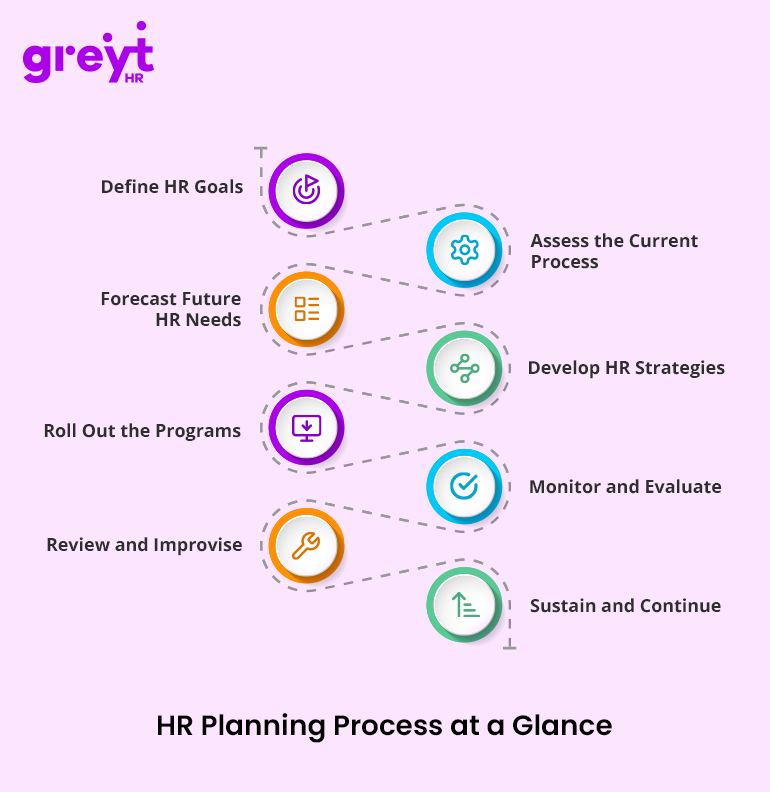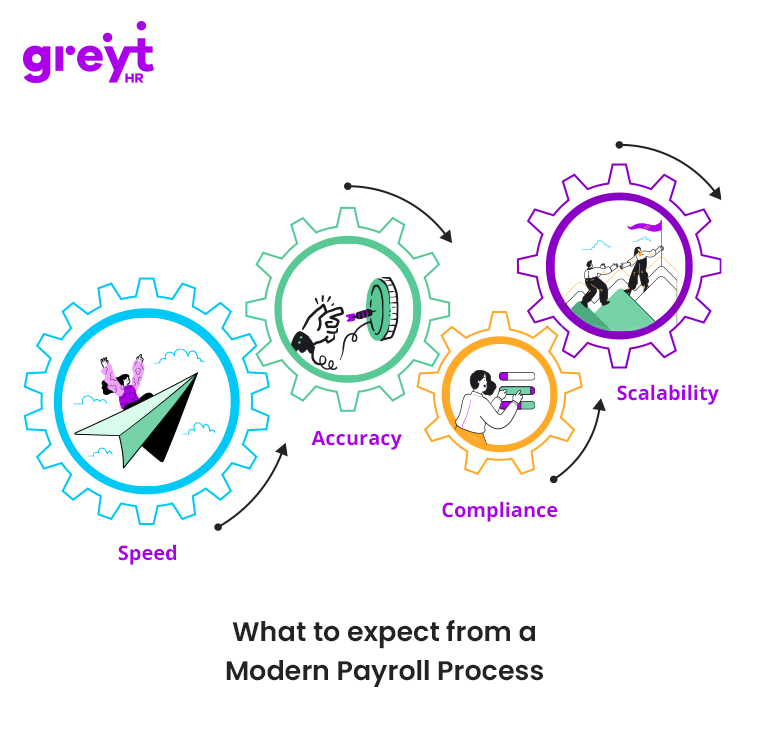Not all organizations have well-optimized HR processes. In today's hypercompetitive business landscape, it is imperative to adopt and optimize seven key HR processes mentioned below. This blog also underlines the modern trends and tools that help transform human resource management (HRM). It also includes findings of the studies by Deloitte and Gartner. 👇
Human resources management is not a walk in the park. It entails the planning and execution of a multitude of activities based on different HR processes and business requirements. Although every HR follows almost the same set of processes, not every company adopts all of them. Also, the ones that adopt these processes may be unable to optimize them for the desired outcomes.
The core objectives of these HR processes are to enhance productivity, boost employee satisfaction, minimize costs, ensure compliance, and help grow the business. Here are seven key HR processes required to help modern organizations survive and thrive in today’s competitive business landscape.
1. Strategic HR Planning
Demotivated employees, dwindling productivity, high turnover, and frequent talent shortages are the telltale signs of a gap in the HR planning process. The adverse effects of suboptimal HR planning can have a domino effect on product quality, customer satisfaction, and business performance.
Since the HR planning process is a crucial phase, it is imperative to take stock of the existing workflows and tasks periodically. Today’s cloud-based HRMS platforms can help automate repetitive HR processes, enabling HR teams to focus on strategic activities.

Also, the policy templates, workflows, checklists, and communication channels help ensure process standardization. The employee self-service (ESS) portal provides employees anywhere-anytime access to critical information while performing multiple HR process-related tasks on their own.
2. Smarter Recruitment & Hiring
Just imagine getting the right person for the right job at the right time. If this crucial HR process isn’t happening like a well-oiled machine, the recruitment strategy needs an overhaul. Only when candidates see value in the organization will they evince interest in joining after selection. HR is expected to handle the arduous tasks of building the employer brand, filling the talent pipeline, and making the best possible offers to the best people.
The advent of cutting-edge recruitment and evaluation systems is helping organizations draw quality talent and reduce the time to hire. The new-age application tracking systems enable HR teams to save time and speed up task execution with automation. Recruiters have now begun to count on AI-based CV screening and gamified assessments for faster selection. Chatbots are doing a great job of answering the fundamental queries of candidates and minimizing the load of recruiters.
3. Thoughtful Employee Onboarding
New employees have a steep learning curve. They have to know their responsibilities, peers, workplace, and tools. Only then can they get up to speed and start contributing to the organization. A manual process can lead to delays in paperwork and verification, errors in documentation, and statutory complexities. Moreover, a poor onboarding experience can demoralize an employee and stymie productivity at work. In today’s hybrid and remote work environments, employees expect onboarding to be a breeze!
Every organization, big or small, has its way of welcoming its new employees. Some of them have more sophisticated processes. However, speed and efficiency are the primary requirements of a modern onboarding program. A cloud-based onboarding software can handle the collection & verification of documents, enable self-service, add employee details, allow access, and do a lot more.
When an employee is onboarded professionally, the possibility of the person being committed and motivated would be higher. Modern businesses are already experiencing the benefits of advanced onboarding processes and tools!
4. Advanced Payroll Management
Is it possible to manage payroll effortlessly and delight every employee every month? That’s easier said than done! Running payroll is about taking input from multiple sources, processing it accurately, preparing the right reports, and ensuring perfect compliance. Payroll professionals also have to avert miscalculations and ensure data security. Ironically, many businesses still use manual processing methods. Modern HR departments factor in the benefits of effective payroll management during the HR planning process itself.
Modern payroll software can enable payroll teams to handle the entire payroll process, from payroll policy design to salary computation and disbursement to statutory remittances. Moreover, the software ensures faster processing, accurate payouts, and guaranteed compliance. When employees are paid accurately and on time, they repose their trust in the company and stay loyal.

Besides generating several MIS reports and compliance statements, payroll software facilitates payroll analytics for data-driven decision making. Put simply, payroll automation enables stress-free month ends and worry-free business operations. Farsighted businesses should never be complacent with this core HR process.
5. Effective Leave & Attendance Management
It may not be easy for every organization to administer uniform leave policies, track & approve multiple leave requests, ensure accurate leave accounting, and manage leave records meticulously. These issues come to the fore when HR finds it challenging to capture and track time and attendance without hassles. All of these challenges can result in poor discipline, low productivity, poor customer service, and revenue leakage.
Leave analytics help managers know the leave patterns of different team members. Employees can also check their leave balances and mark attendance online or on a mobile app on the HRMS. Unlike the manual attendance process, the automated system minimizes the HR load and enhances accuracy while ensuring better workforce management.
Modern HRMS platforms help HR:
- Manage employee leave requests
- Track application status/approvals online
- Get leave status-related notifications
- Capture attendance swipes from multiple devices
- Process attendance automatically
- Ingrate leave and attendance management
6. Bespoke Learning & Development
Not all businesses have the know-how to identify the training needs of their employees. If they do, they must keep the learners engaged and measure the impact of all the programs. Emerging and traditional businesses may require more resources or tools to upskill their employees. The business can innovate and remain competitive only when its employees learn and grow.
Technology has introduced different forms of training across organizations. Most modern organizations have their learning management systems to train their employees. Whether it is on-the-job training or e-learning via portals, trainers and learners have a plethora of options to maximize the impact.
AR and VR are gaining ground in immersive learning. Microlearning delivers byte-sized content on phones. Gamification and simulation enhance training efficiency by exposing learners to real-life scenarios in the virtual environment. Today, learning is no longer confined to the four walls of a physical classroom!
7. Focused Performance Management
Every employee performs multiple tasks at the workplace. However, businesses may face the challenge of aligning this work to individual and organizational goals. They may need a structured performance management system. In many emerging companies, budget constraints curtail the use of advanced tools for performance appraisals. This situation can hurt employee productivity and business performance.
In Deloitte’s 2024 Global Human Capital Trends survey, 74% of respondents said it's very or critically important to seek better ways to measure worker performance and value beyond traditional productivity.
An organization requires a set of processes, feedback mechanisms, and tools to evaluate the performance of employees consistently and accurately. Also, laggards need a bespoke performance improvement plan. Plus, there should be a culture of recognizing and rewarding performers.
Contemporary HRMS platforms have a built-in performance management system. This system automates and streamlines multiple tasks like performance review tracking, performance reporting, manager feedback, and self-appraisals. It also helps embed a culture of recognition into an organization’s daily operations.
Wrapping Up
An organization has to leverage the right blend of people, processes, and technology to compete and win in the modern business environment. Since HR has begun to play a strategic role in modern organizations, they need to be empowered with the right know-how and resources.
As per a Gartner report, 70% of CEOs expect their CHROs to be key players in enterprise strategy. Although an organization has innumerable HR processes that power the employee lifecycle, the focus has to be on the essential processes. Of course, other processes, like benefits administration, claims management, and offboarding, add significant value if executed systematically.
Today’s full-suite HRMS platforms have all the HR modules and workflows to make their HR planning processes and related operational tasks easier. They help automate most of the repetitive tasks and offer insights to help HR make business-critical decisions for the leadership. As a result, they have greater bandwidth to take up strategic initiatives for the benefit of the business.









